
Motivation is shaped by a student’s goals, beliefs, and emotions. Motivated students set meaningful goals, believe in their ability to succeed, and feel positive about their work. Learner motivation is influenced by three key factors: beliefs about themselves, their emotional state, and the environment around them. When students believe they can succeed, feel positive about what they are doing, and are in a supportive, encouraging environment, they are more likely to stay engaged, persevere through challenges, and achieve their goals. Let’s take a closer look at each factor.
Student Beliefs Matter!
When students believe they can succeed, they are more likely to pursue a goal and put in the effort. Those who have confidence in their ability to complete a task are more willing to tackle challenges and find solutions. Confidence helps students persevere, learn from their mistakes, and avoid giving up.
Student Emotions Matter!
When students feel happy, curious, or proud of their work, they are more likely to stay engaged and keep going. On the other hand, when they feel stressed, frustrated, or discouraged, they may avoid the task or give up more easily.
Student Environments and Mindsets Matter!
When students are in a supportive classroom environment with a positive mindset, they are more likely to set learning goals and stay motivated. Teachers who model strategies, provide guided practice, and offer positive feedback and reinforcement boost students’ confidence, helping them stay focused and persist toward their goals. This is especially true in classrooms where mistakes are seen as a natural part of the learning process, allowing students to feel safe as they work to achieve their goals and improve.
Tips and Strategies for Teachers to Boost Student Motivation in the Classroom
Motivation isn't something students either have or don’t have; it can develop over time. With the right environment and a mindset that values learning strategies and effort as keys to success, students can build the motivation they need to face challenges and keep progressing. Teachers play a crucial role in helping students stay motivated and become self-regulated learners. Here are a few ways teachers can help:
- Building Student Confidence: Helping students build their self-efficacy, which is the belief in their ability to succeed on a learning task, is important. When students believe they can succeed, they will keep trying. Teachers can help students build confidence by modeling strategies, giving them small tasks to succeed at first, and then helping them take on bigger ones. It’s also important for teachers to provide positive, specific feedback, focusing on the effort and strategies students use, rather than just the outcomes.
- Helping Students Find Meaning and Value in Learning Goals: Helping students find meaning and value in their learning goals is essential for building motivation and engagement. How students perceive the value of a task greatly affects how much effort they put into it. When students view a task as meaningful or useful, they are more likely to stay engaged and put in their best effort. This sense of value can take different forms. Sometimes, a task feels important because it connects to their future goals, while other times, it holds personal significance by offering a challenge or aligning with their desire for growth and improvement.
- Empowering Students through Voice and Choice: Allowing students to have a say and choice in what they study or how they demonstrate their learning helps them feel more connected to the process. When students are involved in tasks that are personally meaningful or enjoyable, they are more likely to stay focused, persist through difficulties, and take pride in their work boosting their engagement and intrinsic motivation.
The author of this article is Anastasia Kitsantas, professor of Educational Psychology in the School of Education at George Mason University. Educational psychology is a branch of psychology that focuses on understanding how people learn and develop within educational settings. To learn more about degree offerings in this discipline at George Mason, please visit the Educational Psychology Program website.
